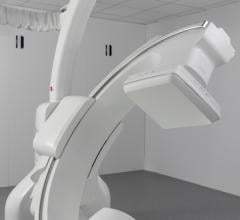
Prediction performance of DL compared to quantitative measures and Kaplan-Meier curves for quartiles of DL. Image created by Singh et al., Cedars-Sinai Medical Center, Los Angeles, CA.
June 14, 2021 — An advanced artificial intelligence technique known as deep learning can predict major adverse cardiac events more accurately than current standard imaging protocols, according to research presented at the Society of Nuclear Medicine and Molecular Imaging 2021 Annual Meeting. Utilizing data from a registry of more than 20,000 patients, researchers developed a novel deep learning network that has the potential to provide patients with an individualized prediction of their annualized risk for adverse events such as heart attack or death.
Deep learning is a subset of artificial intelligence that mimics the workings of the human brain to process data. Deep learning algorithms use multiple layers of "neurons," or non-linear processing units, to learn representations and identify latent features relevant to a specific task, making sense of multiple types of data. It can be used for tasks such as predicting cardiovascular disease and segmenting lungs, among others.
The study utilized information from the largest available multicenter SPECT dataset, the "REgistry of Fast myocardial perfusion Imaging with NExt generation SPECT" (REFINE SPECT), with 20,401 patients. All patients in the registry underwent SPECT MPI, and a deep learning network was used to score them on how likely they were to experience a major adverse cardiac event during the follow-up period. Subjects were followed for an average of 4.7 years.
The deep learning network highlighted regions of the heart that were associated with risk of major adverse cardiac events and provided a risk score in less than one second during testing. Patients with the highest deep learning scores had an annual major adverse cardiac event rate of 9.7 percent, a 10.2-fold increased risk compared to patients with the lowest scores.
"These findings show that artificial intelligence could be incorporated in standard clinical workstations to assist physicians in accurate and fast risk assessment of patients undergoing SPECT MPI scans," said Ananya Singh, MS, a research software engineer in the Slomka Lab at Cedars-Sinai Medical Center in Los Angeles, California. "This work signifies the potential advantage of incorporating artificial intelligence techniques in standard imaging protocols to assist readers with risk stratification."
Abstract 50. "Improved risk assessment of myocardial SPECT using deep learning: report from REFINE SPECT registry," Ananya Singh, Yuka Otaki, Paul Kavanagh, Serge Van Kriekinge, Wei Chih-Chun, Tejas Parekh, Joanna Liang, Damini Dey, Daniel Berman and Piotr Slomka, Department of Imaging, Cedars-Sinai Medical Center, Los Angeles, California; Robert Miller, Department of Cardiac Sciences, University of Calgary, Calgary, Alberta, Canada, and Department of Imaging, Cedars-Sinai Medical Center, Los Angeles, California; Tali Sharir, Department of Nuclear Cardiology, Assuta Medical Centers, Tel Aviv, and Ben Gurion University of the Negev, Beer Sheba, Israel; Andrew Einstein, Division of Cardiology, Department of Medicine and Department of Radiology, Columbia University, Irving Medical Center and New York-Presbyterian Hospital, New York, New York; Mathews Fish, Oregon Heart and Vascular Institute, Sacred Heart Medical Center, Springfield, Oregon; Terrence Ruddy, Division of Cardiology, University of Ottawa Heart Institute, Ottawa, Ontario, Canada; Philipp Kaufmann, Department of Nuclear Medicine, Cardiac Imaging, University Hospital Zurich, Zurich, Switzerland; Albert Sinusas and Edward Miller, Section of Cardiovascular Medicine, Department of Internal Medicine, Yale University School of Medicine New Haven, Connecticut; Timothy Bateman, Department of Imaging, Cardiovascular Imaging Technologies LLC, Kansas City, Missouri; Sharmila Dorbala and Marcelo Di Carli, Department of Radiology, Division of Nuclear Medicine and Molecular Imaging, Brigham and Women's Hospital, Boston, Massachusetts.
For moreinformation: www.snmmi.org


 February 05, 2026
February 05, 2026 









